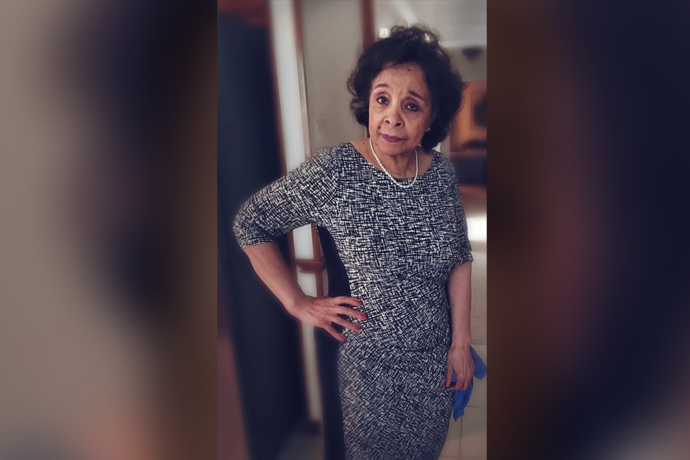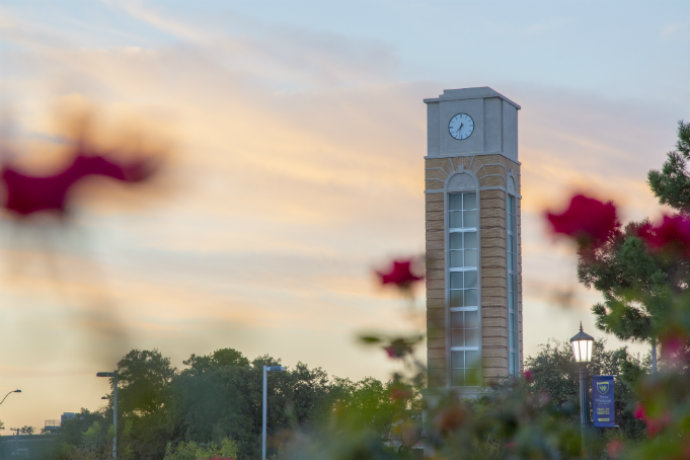How the Bell family made Texas Wesleyan 'home' for many generations

One person with one goal can make some of the biggest impacts on our lives. It’s people like Victoria Bell who not only made a difference for her children, but left a legacy of hardworking, compassionate people who have touched Texas Wesleyan in different ways.
Victoria is the mother of Thomas Bell, Ph.D., professor of business administration at Texas Wesleyan. But she’s also the mother to five other children, several of who graduated from the University.
After her husband passed away, Victoria became the sole provider for the family. She had previously been a stay-at-home mother, raising her children and taking care of their home.
“When he passed, it turned our whole world upside down,” Dr. Bell said.
She found a job as a housekeeper at Texas Wesleyan — where she worked for 28 years and retired. This allowed her to give the younger children an opportunity to receive a higher education at the University, which was right down the street from their Stop Six neighborhood. The family was excited because they always thought that Texas Wesleyan would be a good school to attend.
“Going to college was never really an option, it was expected,” Dr. Bell said. “Being able to provide us the opportunity to take advantage of that perk that she had, it was a godsend.”
But the legacy doesn’t end with her own kids. Her grandchildren also have degrees from Texas Wesleyan, and her great-grandson is also considering attending the University.
“I would say, in my extended family, there are 15 to 18 degrees from Texas Wesleyan,” Dr. Bell said. “I can’t say I have a degree from Texas Wesleyan, but I do have the good fortune of being a part of Texas Wesleyan.
“My mother often jokes about the fact that she doesn’t have a degree, but really she’s got 12 degrees because of the family,” he said.
When reflecting on his parents, he recounted that they didn’t have the same opportunities that he had. It was their hard work and motivation to provide more for their kids that helped the Bell children become successful.
“They instilled in us the dream to see something bigger for our own lives, realizing that just because this is where you are, doesn’t mean this is where you have to be,” he said. “If you’re willing to apply yourself, develop a work ethic – the sky’s the limit.”
Bell took classes at Texas Wesleyan but then transferred to Prairie View A&M University to study electrical engineering. He worked in engineering and was beginning to get into management when his major professor told him he should consider teaching.
“I never really thought much about it because it wasn’t on my radar,” he said. However, after his professor found an opportunity for him to teach a weekend program at TXWES, his mother also urged him to come to the University.
“You do what your mother says,” he laughed. “I haven’t had one day of regret ever since. I’m just having the time of my life.”
Bell started working at Texas Wesleyan in 1995 as a weekend professor but was soon offered a full-time position. He and his mother worked together at the University for a few years before she retired.
“It was neat, because I would see her on campus, and I would get a chance to hang out with her,” he said. “When she retired, I felt like I lost my best friend.”
Through a program at Texas Wesleyan that helped master’s prepared professors get their doctorate, he was able to get a doctoral degree and gain tenure. And despite being offered a position at a historically black college and university (HBCU), Bell chose to stay at Texas Wesleyan.
“I couldn’t, at this point, imagine being anywhere else,” he said. “I did feel a sense of obligation, but you got to bloom where you’re planted. And I just felt like this where I need to be.”
Bell touched on how he was contacted by his alma mater, an HBCU, because it needed more black professors — a trend seen in academia still to this day.
“When I’m reminded that I’m a [minority] professor, that’s not something I think about,” he said. “I don’t feel it, I don’t see it. I just see my peers, my co-workers. I don’t feel any special or feel any different. I’m doing what I enjoy doing with people that I enjoy working around and with.”
It’s something that he also understands touches the lives of his students. He understands that seeing someone that you can relate to can help bring inspiration to others
“I don’t dismiss or discount the role that I play when I step into the classroom,” he said. “I have students that look at me, certainly as a professor, but also because of what I represent as a black male. I’m just representing me and trying to be the best person I can be when I step into the classroom. ”
What stands out most about Bell is the smile he has on his face when he talks about the opportunity that his mother and Texas Wesleyan provided him, something that he knows sheds light on who he is today.
“This is a great place. I tell my wife I’m not going to work; I’m going to school. This is my home away from home,” he said. “My siblings and I are proud of my mom, glad that she provided us with the love and support that she did — and if not for her, I’m sure I wouldn’t be here now.”








